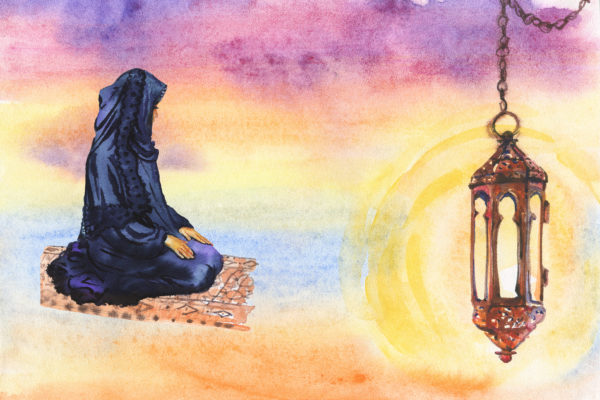Is secularism always the solution? 🤔
Is secularism always the solution? 🤔
The negative conditions of the Muslim world today are due to many different factors, none of which have anything to do with Islam as a religion and a way of life.
However, a lot of people, especially in the West, still fail to see that. Many are convinced that Islam is the reason, the main reason, for the Ummah’s backwardness, and subsequently for the ill-manifestation and representation of women’s creativity and rights.
In the book “Price of Honor”, Jan Goodwin explains: “Gender issues and, in particular, the rights of women in Muslim Culture, continue to generate much media attention in the West. Muslim women are often portrayed as inferior beings, desperately in need of liberation from the Muslim Culture that prevents their progress…. Such misunderstandings are largely due to naïve and simplistic attempts to transpose a Western set of norms and values onto women with a very different history and culture.” (Goodwin, 1995)
As an example of this kind of Western media view and presentation of Islam and Muslims, I would like to include a sample of how they almost always refer to the matter of Islam and women. This sample is only one of many. It is taken from ‘TIME’ magazine, one of the most respected, trusted, and renowned news and information outlets. In an article titled ‘The Women of Islam’ published Just after the 9/11 events in 2001, the writer, Lisa Breyer, starts with a good notion about the Prophet (peace be upon him), then everything starts going downward from there on out:
“For his day, the Prophet Muhammad was a feminist. The doctrine he laid out as the revealed word of God considerably improved the status of women in 7th century Arabia,” she says, then she points the reader’s direction to modern time Muslims claiming that Islam does not suit the modern day living: “Of course, ancient advances do not mean that much to women 14 centuries later if reform is, rather than a process, a historical blip subject to reversal. While it is impossible, given their diversity, to paint one picture of women living under Islam today, it is clear that the religion has been used in most Muslim countries not to liberate but to entrench inequality.” (Beyer, 2001)
Then she throws in a sentence which she will use later to suggest that it is the best solution for the problems women face today in the Muslim world: “Where Muslims have afforded women the greatest degree of equality – in Turkey – they have done so by overthrowing Islamic precepts in favor of secular rule.” So, obviously, like so many other Westerners and Westernized Arabs, she suggests that secularism is the solution.
After planting the seeds of secularism as an option in the minds of her readers, Beyer starts watering them with false accusations against the Prophet (peace be upon him), saying: “Part of the problem dates to Muhammad. Even as he proclaimed new rights for women, he enshrined their inequality in immutable law, passed down as God’s commandments and eventually recorded in scripture”, claiming that he (peace be upon him) is to blame for setting rules that reflect inequality between men and women, and implying that he (peace be upon him) ‘’claims’’ that those rules are from God.
Then she backs up her accusations with a very twisted understanding of Islamic rules and principles, and disgusting and un-Islamic practices of some Muslims and extremists. She takes the Taliban as an example, as well as some of the practices found in some Muslim countries; thus mixing the sometimes horrible traditions with Islamic precepts. Readers who are not familiar with Islamic law and those who are not very profound in it will easily be tricked into believing these practices as part of Islam.
The writer then concludes the article with the solution suggested earlier by saying: “Turkey is an exception to many rules. Women in Turkey are the most liberated in the Muslim world, though Malaysia and Indonesia come close, having hosted relatively progressive cultures before Islam came to Southeast Asia in the 9th century. In Turkish professional life, women enjoy a level of importance that is impressive not only by the standards of other Islamic countries but also by European lights. Turkey’s liberalism is a legacy of the republic’s founder, Mustafa Kemal Ataturk, an aggressive secularist who gave women rights unprecedented in the Muslim world (even if he found it hard to accept women as equals in his own life).” (Beyer, 2001) Thus drawing a heroic picture of Ataturk, who is known among Muslims to have done more harm to Islam than anyone in his time.
This article is only an example of the misconception and the tone that are most outspread in the West about Islam and Muslims. The major mistake they commit is attributing false traditions and practices and false understandings of Islam of some Muslims in some countries and some societies to the religion of Islam. The truth is that Islam is probably just as victimized in this respect as the women whom they are trying to defend, so to speak.
In a study titled “Engaging with Islam to Promote Women’s Rights: Exploring Opportunities and Challenging Assumptions”, researchers Nida Kirmani and Isabel Phillips mention an argument made by British journalist and women’s rights campaigner, Cassandra Balchin, which claims that “the focus on women and religion falls into three broad categories: those that perceive religion as an obstacle to achieving development; those that see religion as the most significant development issue; and those that see ‘Islamic feminism’ as a development solution.”
Kirmani and Phillips go on to include Balchin’s argument that “much of the donor discourse falls into the Orientalist trap and blames Muslim men and ‘culture’, which is equated with religion, for women’s oppression.” Kirmani and Phillips then explain that Balchin’s claim “ignores women’s ongoing struggles as well as global inequalities and politics that determine local power dynamics. As well, donor approaches often equate ‘Islamic’ with ‘Muslim’, thus assuming that the practices of all Muslims must be ‘Islamic’ and ignoring cultural variations as well as the myriad other factors apart from religion that determine the behaviours of those identified as Muslims.” (Kirmani & Phillips)
I believe that the researchers have managed to summarize the whole problem in that last sentence.





